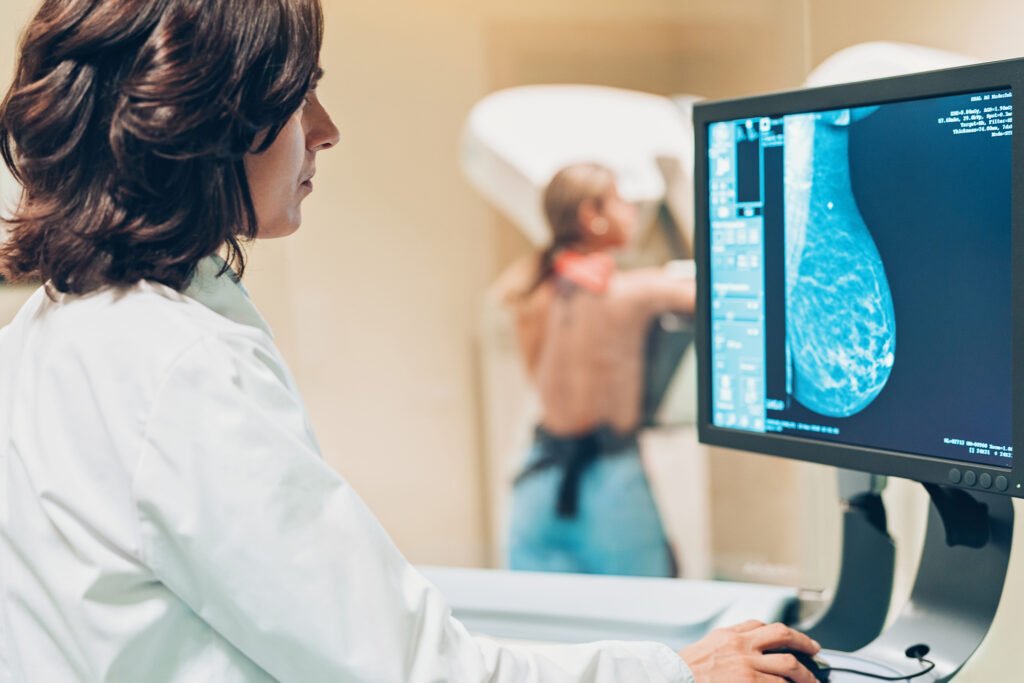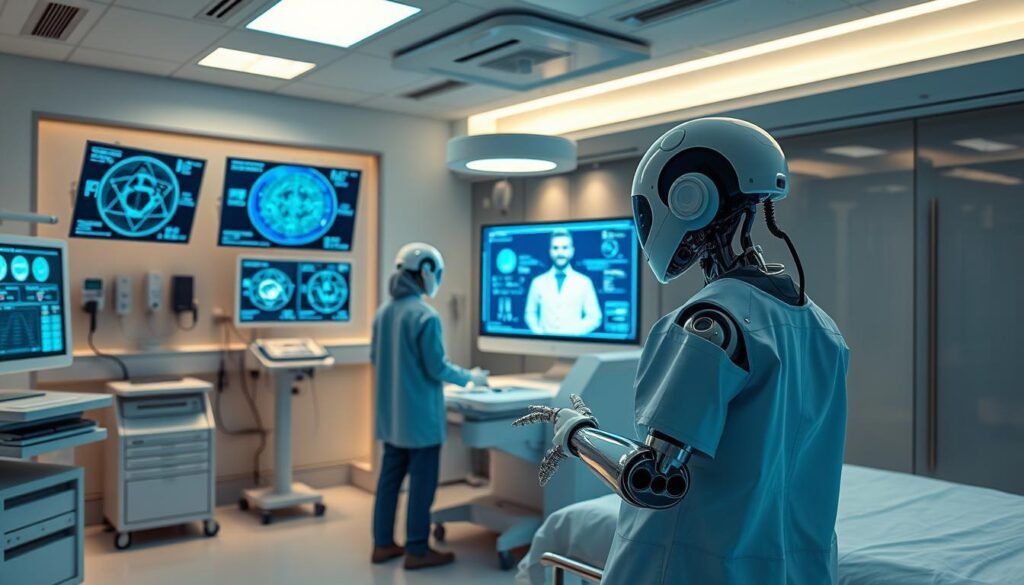
Table of Contents
- AI in Diagnostics: Enhancing Speed and Accuracy with Real-Time Data
- Accelerating Drug Discovery: AI’s Role in Bringing Treatments to Market
- Personalized Medicine: AI’s Role in Tailoring Treatment Plans
- AI-Enabled Virtual Health Assistants and Remote Monitoring: Enhancing Accessibility and Chronic Care
- AI in Predictive Analytics for Population Health: Managing Public Health with Data
- Conclusion: The Road Ahead for AI in Healthcare
The healthcare industry is entering a new era driven by artificial intelligence (AI), with promising applications that are enhancing patient outcomes, streamlining workflows, and expanding access to care. From AI-driven diagnostics to personalized medicine and drug discovery, AI’s capabilities are transforming the way healthcare professionals operate and how patients experience care. But while AI offers immense potential, it also brings ethical challenges and implementation hurdles. How exactly is AI reshaping healthcare, and what might this mean for the future of medical science?
In this in-depth look, we’ll explore the current applications of AI across various sectors in healthcare, supported by real-world case studies and expert perspectives that showcase the industry’s evolving landscape.
AI in Diagnostics: Enhancing Speed and Accuracy with Real-Time Data

In healthcare, timing and accuracy are critical, especially in diagnosing diseases. AI has shown transformative potential in diagnostics by identifying patterns in medical images, genetic data, and patient histories faster and more accurately than traditional methods.
Case Study: AI and Mammogram Analysis for Breast Cancer Detection
Breast cancer is one of the most common cancers affecting women worldwide, and early detection is crucial. Traditional mammograms, however, can lead to false positives or negatives, impacting treatment decisions. Google Health’s AI model has been groundbreaking in this area. In a 2020 study published in Nature, the AI outperformed human radiologists in breast cancer detection by reducing false positives by 5.7% and false negatives by 9.4%.
“The precision we’re seeing with AI in diagnostics is transformative. It’s not just about matching human radiologists—it’s about enabling them to make faster and more informed decisions,” explains Dr. Lily Peng, product manager at Google Health.
This AI model uses deep learning to analyze mammograms, identifying suspicious areas with a higher degree of accuracy. Not only does this technology improve diagnostic accuracy, but it also significantly reduces the workload for radiologists, allowing them to focus on more complex cases and spend more time with patients.
Case Study: COVID-19 Screening with AI-Powered CT Scans
During the height of the COVID-19 pandemic, hospitals were overwhelmed with patients needing immediate diagnosis and care. Chinese company Infervision developed an AI solution that could analyze CT scans to detect signs of COVID-19 in the lungs. This technology helped healthcare facilities manage high volumes of patients, prioritizing those who required urgent care.
“AI’s role in managing the COVID-19 crisis has shown that it’s not just a futuristic tool; it’s ready for real-world, high-stakes applications,” says Dr. Andrew Ng, a leading AI researcher.
This use of AI demonstrated how quickly these systems could be adapted to support healthcare providers in times of crisis. Similar AI models are now being developed for other respiratory diseases, enabling early diagnosis and monitoring in real-time.
Accelerating Drug Discovery: AI’s Role in Bringing Treatments to Market

Drug discovery has traditionally been an expensive, time-intensive process with high failure rates. However, AI is expediting drug development by analyzing molecular structures, predicting drug efficacy, and identifying potential side effects, sometimes within a fraction of the usual time.
Case Study: Insilico Medicine’s AI in Drug Discovery for Lung Disease
Insilico Medicine, an AI-driven drug discovery company, achieved a breakthrough by developing a preclinical drug candidate for idiopathic pulmonary fibrosis (IPF) in less than 18 months. This achievement, which would typically take years, highlights the efficiency of AI in identifying and refining drug candidates. Insilico’s platform uses AI to analyze extensive biomedical data and predict drug-like molecules, enabling researchers to focus on the most promising candidates.
“AI has the potential to cut the drug development timeline by more than half, which could mean life-saving drugs reach patients faster,” says Dr. Alex Zhavoronkov, CEO of Insilico Medicine.
By quickly identifying viable drug compounds, AI could reduce the cost of drug discovery significantly. Insilico’s platform even shows potential for identifying drugs that can be repurposed for other conditions, further reducing research time and costs.
AI for Repurposing Existing Drugs: BenevolentAI’s COVID-19 Solution
Drug repurposing is an area where AI’s capabilities are shining. During the COVID-19 pandemic, AI-driven company BenevolentAI identified baricitinib, a rheumatoid arthritis drug, as a potential treatment for COVID-19. Using its AI platform to analyze connections between diseases and drugs, BenevolentAI found that baricitinib could block viral entry into human cells.
“Drug repurposing using AI is a powerful approach. In a crisis like a pandemic, the ability to quickly adapt existing drugs saves valuable time and resources,” notes Dr. Jackie Hunter, Board Director at BenevolentAI.
Baricitinib showed promising results in clinical trials and was granted emergency use authorization for COVID-19. AI-enabled drug repurposing is now a critical tool for accelerating treatments during global health crises.
Personalized Medicine: AI’s Role in Tailoring Treatment Plans

Personalized or precision medicine seeks to tailor medical treatment to individual patients based on their genetic profile, lifestyle, and environmental factors. AI is facilitating this approach by analyzing large datasets, from genomic information to treatment responses, to develop customized therapies.
Case Study: IBM Watson’s Role in Personalized Cancer Treatment
IBM Watson for Oncology has been a pioneering AI tool in personalized medicine. By analyzing a patient’s genetic data and treatment history, Watson suggests tailored treatment options that align with the individual’s unique cancer profile. This approach enables oncologists to provide more targeted treatments, potentially improving patient outcomes.
“Each cancer patient’s journey is unique, and AI gives us a tool to align treatments with individual needs, which is paramount in fighting a disease as complex as cancer,” says Dr. David Chan, an oncologist specializing in AI-driven treatment strategies.
IBM Watson’s approach combines machine learning with extensive medical literature, providing physicians with data-backed recommendations. The AI’s deep understanding of genetics and disease patterns allows it to suggest the most effective treatments, taking into account drug interactions and potential side effects specific to each patient.
AI-Powered Genomics for Predicting Drug Response
Tempus, a healthcare company specializing in precision medicine, uses AI to analyze patients’ genetic data to predict their response to specific drugs. By collecting data from DNA, RNA, and clinical information, Tempus’ AI algorithms help identify treatment options with the highest likelihood of success for individual cancer patients.
“Genomic data can tell us more than we ever imagined about patient responses, and AI is the key to unlocking those insights,” states Dr. Eric Lefkofsky, CEO of Tempus.
This personalized approach is not limited to cancer. For conditions like autoimmune diseases and mental health disorders, AI-driven genomics is helping uncover new treatment pathways, making precision medicine a reality for a broader range of conditions.
AI-Enabled Virtual Health Assistants and Remote Monitoring: Enhancing Accessibility and Chronic Care

With the rise of telemedicine and virtual health tools, AI-driven assistants are playing an increasingly important role in patient care. These systems can triage symptoms, manage appointments, and even provide health advice based on a patient’s medical history.
Case Study: Babylon Health’s AI Chatbot for Virtual Health Consultations
Babylon Health, a UK-based healthcare company, developed an AI chatbot that helps patients assess symptoms and suggest possible actions, such as visiting a doctor or taking medication. The chatbot uses natural language processing to understand symptoms reported by users and cross-references them with a database of symptoms and conditions.
“Virtual health tools like Babylon’s chatbot make healthcare more accessible, especially for people in underserved areas or those with limited mobility,” says Dr. Ali Parsa, CEO of Babylon Health.
This virtual assistant has shown success in providing timely healthcare advice and improving accessibility, especially for people in remote or underserved regions. Additionally, it reduces the burden on emergency rooms and clinics by helping patients manage minor symptoms independently.
Remote Monitoring and Chronic Disease Management
Biofourmis, a Boston-based company, uses AI-driven wearables for real-time monitoring of patients with chronic conditions like heart disease and diabetes. These wearables track vital signs and send data to healthcare providers, enabling them to intervene before an emergency occurs.
“Remote monitoring tools powered by AI allow continuous patient tracking, which is critical for managing chronic diseases,” says Dr. Kuldeep Singh Rajput, CEO of Biofourmis.
This proactive approach improves outcomes for chronic disease patients, reducing hospital readmissions and allowing healthcare providers to intervene earlier. By detecting signs of deterioration, these tools enable timely treatment adjustments, enhancing quality of life for patients.
AI in Predictive Analytics for Population Health: Managing Public Health with Data

AI is being used for predictive analytics in public health, helping organizations forecast disease trends, allocate resources, and create interventions before a crisis occurs.
Case Study: Predictive Models to Track and Mitigate COVID-19
During the early stages of COVID-19, Canadian company BlueDot used AI to predict the outbreak’s spread and identify hotspots based on travel data, population density, and social behaviors. Their AI-driven model accurately anticipated the spread to other regions, enabling public health officials to prepare.
“AI in predictive analytics provides insights that allow us to see emerging health threats and respond before they become unmanageable,” says Kamran Khan, CEO of BlueDot.
The ability to predict disease outbreaks could be instrumental in managing future pandemics and other public health challenges. Similar models are now being developed to track flu seasons and other infectious disease outbreaks, potentially reducing the impact of these illnesses on healthcare systems.
AI for Managing Chronic Disease in Populations
AI’s predictive analytics capabilities are also valuable in chronic disease management at the population level. Health Catalyst, an AI-driven analytics company, uses data to predict high-risk patients within populations, allowing healthcare providers to allocate resources and design intervention programs for preventive care.
“With AI, we’re moving from reactive to proactive healthcare, where data helps us intervene early,” says Dr. Dale Sanders, Chief Strategy Officer of Health Catalyst.
Conclusion: The Road Ahead for AI in Healthcare
AI’s presence in healthcare is undeniably transformative, with its applications already enhancing diagnostics, treatment personalization, drug discovery, and patient care. Yet, as with any powerful technology, its widespread adoption raises ethical considerations. Issues such as patient data privacy, algorithmic bias, and the transparency of AI decisions are critical challenges that require careful oversight and regulatory frameworks.
The future of AI in healthcare looks promising, but a patient-centered, ethically sound approach will be crucial to harnessing its full potential. The technology is poised not just to support healthcare providers but to redefine what it means to provide care, creating a healthcare system that’s faster, more accurate, and ultimately more attuned to the needs of each individual patient.
